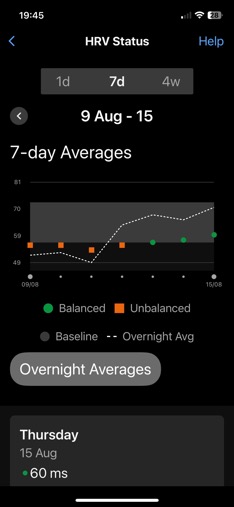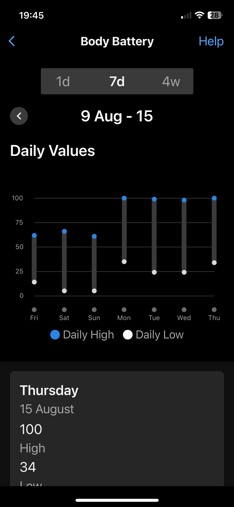The Six Days that wasn't
This week I was supposed to be in Viadal in Sweden running a six-day race. Instead, thanks to SAS, I’m sat at home. However maybe SAS saved me from digging myself into a big hole.
Recovery from the Pennine Bridleway Challenge in April was slower than I’d have liked. However by mid-June things were going OK, certainly much better than when covid derailed the run-up to the Kauhajoki 6 day in 2022. Then (during a stupidly busy few weeks at the end of a challenging academic year) I got covid again. Thankfully I recovered sufficiently to go on a big holiday (a 2.5 week trip to Japan to celebrate my 50th birthday). But I wasn’t quite right: less energy than usual and a lingering cough which got worse again on the journey home. A 3-week gap between the holiday and the six-day race was never going to be ideal, however, there aren’t many six-days which fit in with University term dates. In retrospect I probably should have spent those 3 weeks resting, however, I didn’t want to go 2 months without any training. Running gently didn’t seem to make the cough any worse, so I did a few easy 3 to 4-hour run-walks and a couple of short runs, followed by a week of no exercise. I’d hoped I’d feel better after the rest, however as the week went on I felt worse and worse. The breathing issues were joined by digestive weirdness and tiredness, my RHR rose and HRV dropped. I wasn’t sure that trying to run-walk for six days was a good idea, but I decided to go to the race with a big pile of books, take it easy and see how it went.
I was supposed to be flying from Manchester to Copenhagen on Saturday morning. A 2-hour train ride followed by a lift from the train station would get me to Viadal by late afternoon. I should have had plenty of time to get my tent sent up and relax before the race started at midday on Sunday.
I started worrying at about 9.30 when the departure board still said ‘relax, gate announced at 9.05’. Not long after I got a message from SAS saying the flight was delayed by 3 hours. A bit annoying as I could really have done with another 3 hours sleep, but not a disaster. After messaging the race organisers about my delayed arrival, I had a big late breakfast and killed time by messing around on my phone. I looked up the incoming flight on Flight Radar. It was on its way to Manchester, having diverted back to Copenhagen after its initial take-off. I’m a planner and always like to have plans B, C and D. Having experienced a poorly handled SAS flight cancellation last Summer, I started investigating alternative routes. It didn’t look good; the only way of getting to Copenhagen by mid-morning Sunday from Manchester involved a six-hour overnight stopover at another airport.
The departure board never updated and I got increasingly irritated by the cheery ‘relax’ message. I only found out the gate number by constantly refreshing the SAS app. After a delay while passengers found their way to the gate, we eventually took off just over 3 hours late. I settled into reading one of the books I was carrying. 30 min into the flight the pilot made an announcement and my heart dropped. It was in Swedish first but (thanks to the 2 years I spent living in Stockholm in my 20s) I understood the gist of it: we were returning to Manchester due to an issue with the plane.
Fire engines were waiting for us and the plane used a lot more runway than usual to come to a stop. We spent a long time at the end of the runway before taxiing to a distant corner of the apron. The phone signal was too weak for me to research alternative flight options, but I texted the OH and he got on it for me. It was now too late for the alternative route I found earlier. The ‘least worst’ option was to get a train to Edinburgh and a very early Ryanair flight which would get me to the race a couple of hours after it started.
Eventually, the flight was cancelled (by email, no announcement was ever made) and we were bussed back to the terminal to collect baggage. Even that wasn’t completely smooth. The automatic passport gates wouldn’t let me through and I had to go to a border agent:
Them: ’Where’ve you come from?’
Miserable me: ‘nowhere’
Them: raised eyebrow
Miserable me: ‘my plane just returned here’
Once land-side I phoned the OH to talk through what I wanted to do. During the call, a rebooking email from SAS arrived. They’d put me on a flight the next morning via London which wouldn’t even get into Copenhagen until after the race started. I seriously considered the Ryanair Edinburgh option. Realistically I’d be at least 4 hours late starting the race (which would cost me ~14 miles). Worse than that I’d be exhausted before I even started and I was already feeling pretty tired. I decided to cut my losses and get the train home again.
I was expecting to have a big cry at some point but the tears never came. The closest I got was when the race organisers kindly replied to my email saying I wouldn’t make it to the race saying they’d refund my full entry fee. I also vented some of my anger/frustration by composing a complaining email to SAS (and have subsequently at least been told I’ll receive a full refund, there may still be a battle to be fought for the compensation).
I spent Saturday evening and most of Sunday feeling pretty miserable. After 393 miles in Kauhajoki in 2022, a 400+ mile six-day felt tantalisingly within reach. Two years later, I haven’t even got close. Last Summer ‘Six Days in the Dome’ went badly wrong. This year I didn’t even make it to the start. I was quietly hoping 400 miles might still be possible since I managed 393 off very little training. However, this time I was lacking health rather than fitness/training, and potentially if I’d started I could have caused myself long-term issues. Having just turned 50, time and health are both beginning to feel finite. (And I feel guilty being unhappy about this, given that overall I’m lucky to be fairly fit and healthy.)
At the peak of my miserablism, I wondered whether multi-day running (and chasing 400 miles in six days) was worth it any more. Are the highs now too few and far between to justify the time, energy and expense? At some point, the answer might well be no, but I don’t think I’m quite there yet. While there are some lessons to learn, I’ve also had a lot of ‘one-off’ bad luck. For the last year, life has felt like a driving game, where I’ve been trying to navigate a high-difficulty course at high speed while unexpected obstacles get thrown in my path. This week, with a week off work and no plans, I’ve been able to do what I want when I want. And I’m feeling much much better, both physically and mentally, so maybe SAS did me a favour. Potentially last week my body was trying to tell me that running for 6 days was a bad idea (it’s also possible it was just an extreme case of stress-induced ‘taperitis’).
The cough/chest seems to be getting better and I already fancy a run or bike ride. But I’ll be sensible and continue resting until I’m 100% better. And in the meantime, I’m making plans for next year, bearing in mind the lessons I’ve learnt this year:
i) arrive at overseas races two rather than one day in advance,
ii) prioritise health over fitness.


The benefits of a few days rest.